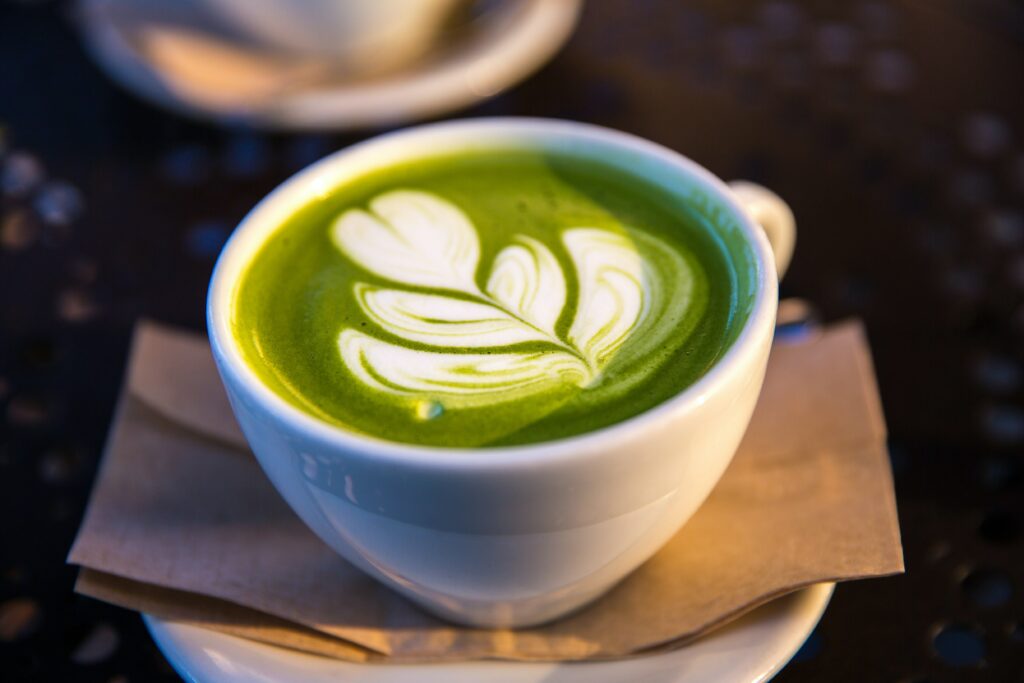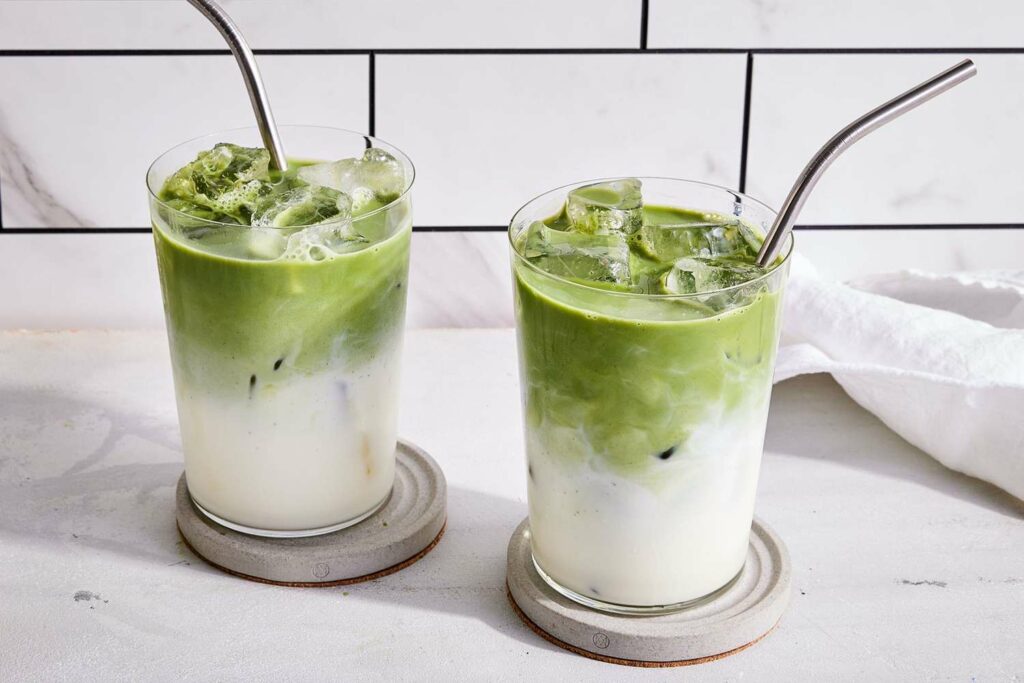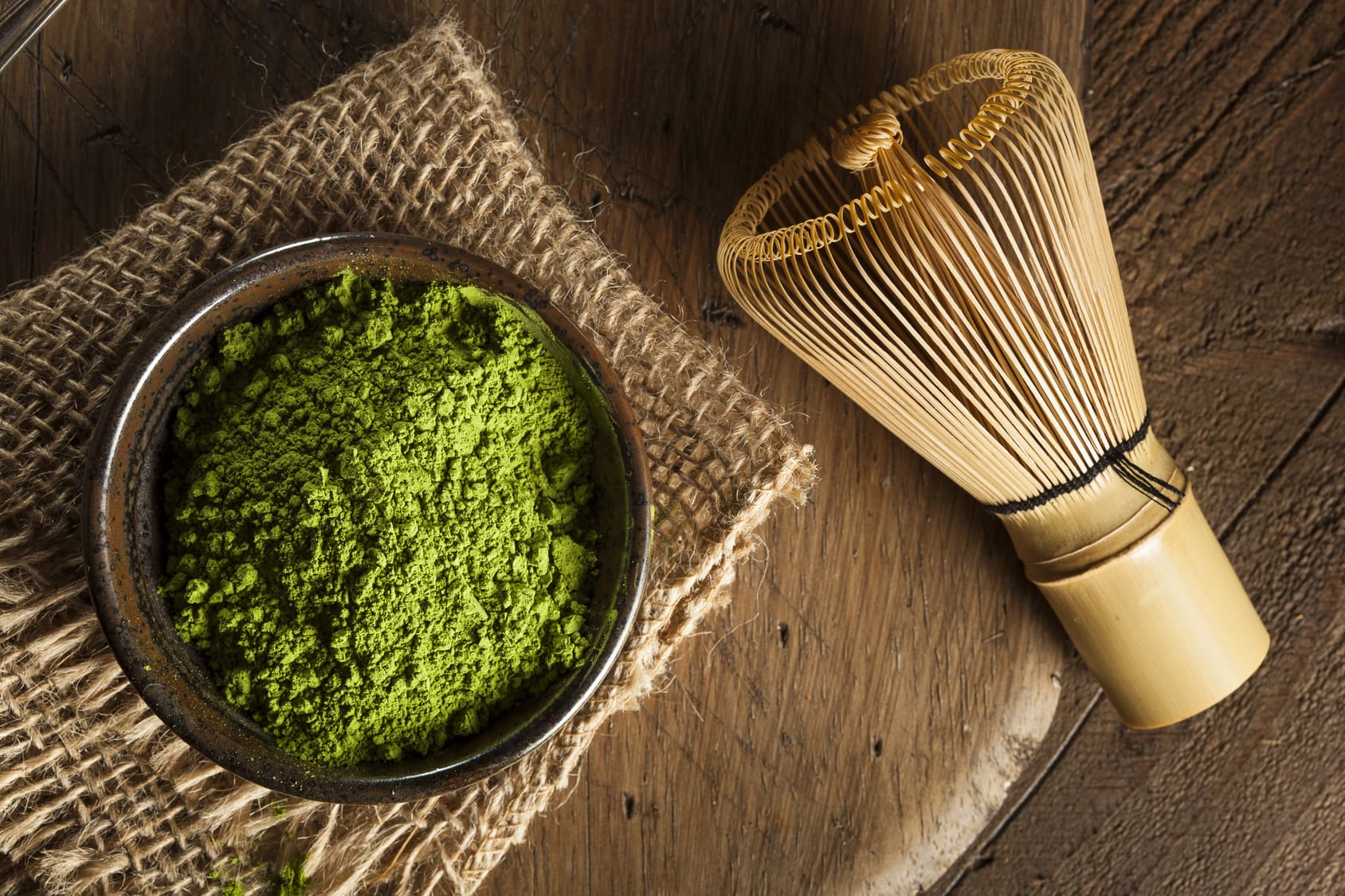Matcha is considered one of the top “superfoods” along with turmeric, ginger, kefir, wild blueberries, and mushrooms. This green tea is available in powdered form and can be easily incorporated into smoothies, drinks, and baked goods. Matcha can be found in a variety of sweet beverages like boba and desserts like candy and ice cream. While some enjoy the earthy flavor that matcha adds, others are interested in the purported health benefits.
Matcha is believed to be richer in polyphenols than regular green tea. According to William Li, MD, a physician and food researcher, the antioxidants in matcha have been shown to offer several health benefits, including increased metabolism, lowered cholesterol, and improved circulation. Matcha and green tea are high in catechins and have been shown to support everything from digestion to heart health to metabolism, cognitive function, cancer prevention, etc.
Matcha originated in Japan around a thousand years ago and comes from the Camellia sinensis plant. Although it is in the same family as green tea, it is harvested differently, and this is why matcha may have an advantage over green tea. To make Japanese matcha, the tea plant is protected from direct sunlight, which increases compounds like chlorophyll, caffeine, amino acids, and antioxidants.
However, you don’t need to buy expensive treats or Instagram-worthy drinks at a coffee shop to try matcha. You can make matcha at home by whisking the powder into your liquid of choice.
1. Matcha instead of coffee

Many people turn to coffee or energy drinks to boost their energy levels throughout the day, especially if they don’t get enough sleep. However, matcha is another source of caffeine worth considering.
Matcha is a richer source of caffeine than coffee, green tea, or black tea. The caffeine content in matcha can vary, but the authors of the Molecules article state it’s between 18.9 and 44.4 mg per gram of matcha powder. Each 8-ounce cup of matcha, made with matcha powder and water, contains 76–180 mg of caffeine.
Although matcha is a good source of caffeine, it’s important to note that it may trigger symptoms of IBS, IBD, anxiety, or insomnia in some people, says Jenna Volpe, RDN. Therefore, it’s not recommended for everyone to increase their caffeine intake. It’s also important to consume caffeine in the morning, rather than the afternoon or evening, to avoid interfering with your sleep. The National Sleep Foundation suggests stopping caffeine consumption at least eight hours before bedtime.
2. Improving attention and memory
A study involving tired college students suggests that caffeine not only increases energy and alertness, but also aids in completing memory tasks during nonoptimal times, such as early mornings. Theanine, an amino acid found in matcha, is also associated with better focus and lower stress, according to the Cleveland Clinic, which may enhance these effects.
Dr. Li cites a randomized controlled trial published in Nutrition Research in April 2021 that found that drinking matcha improves attention, focus, and cognitive function in young adults facing acute stress. A similar study involving middle-aged and older adults was conducted by the same researchers and published in Nutrients in May 2021, with caffeine-enhanced matcha showing more attention and work performance improvement in people under psychological stress than caffeine alone.
The presence of theanine, caffeine, and EGCG in matcha has led some researchers to refer to it as a “mood-and-brain food” for its effects on attention and memory.
3. Protection against neurodegenerative disorders and cognitive decline
If you’re looking to safeguard against brain disease, consider incorporating matcha into your diet.
According to Volpe, “Matcha is significantly higher in quercetin, a pigmented flavonoid that has special antioxidant properties, essentially protecting our cells from damage and reducing the aging process in a multitude of ways.” A study in December 2020 Nutrients found that matcha is also high in vitamin K, and daily consumption of matcha powder had protective effects against cognitive decline in elderly women.
Matcha is frequently studied for its potential role in Alzheimer’s and other neurodegenerative disorders, partly due to its high quercetin content, which can cross the blood-brain barrier, as noted in a review published in the April 2022 Molecules. Another review, published in the January 2020 issue of Biomolecules, documented the well-established link between quercetin and neuroprotective effects against Alzheimer’s disease.
4. Matcha has cardioprotective benefits

Heart health is crucial, yet heart-related problems are still prevalent in the US, with an estimated 47 percent of adults having hypertension, or high blood pressure, according to the CDC. This condition is often called the “silent killer” since it has no physical symptoms and can only be detected through blood pressure tests. Maintaining healthy blood pressure levels is essential, as high levels increase the risk of heart attack, stroke, heart failure, and other severe health issues, as noted by the Mayo Clinic.
The good news is that matcha can be part of a heart-healthy lifestyle. While no single food is a cure-all for preventing disease, incorporating matcha as part of a balanced diet may help, according to Volpe. “The EGCG in matcha can reduce oxidative stress and inflammation, two contributors to heart disease,” she says, adding that the tea’s cardioprotective effects have been extensively studied. Although most of the research focuses on green tea or animals, a previous meta-analysis discovered a link between green tea consumption and favorable outcomes concerning the risk of heart disease. Past animal studies suggest that matcha may help lower total cholesterol, triglycerides, and blood glucose, but more rigorous human research is needed to confirm these findings.
5. Possible anticancer benefits from the antioxidants
While there’s no single cure-all for preventing cancer, incorporating matcha into a healthy diet could be a beneficial step. Ongoing research suggests that matcha may help to inhibit and prevent the growth of cancer cells, according to Volpe. The chemopreventive effect of EGCG, a tea compound, may play a significant role in preventing certain types of cancer, as suggested by clinical evidence in a review published in July 2020 in Molecules.
Most of the anticancer research on matcha and EGCG is focused on breast and colon cancers. Li points out that matcha could potentially inhibit the growth of breast cancer stem cells, which are often the cause of recurrence after successful treatment. Another study has shown that EGCG could suppress colon cancer stem cells.
While a review published in November 2022 in Current Research in Food Science suggests that matcha may possess anti-tumor properties, further research is needed.
6. Supports a healthy weight and metabolism
If weight loss is your goal, your drink choices matter. Previous research has shown why sugar-sweetened beverages should be avoided, but what should you drink instead, especially if plain water isn’t appealing?
Well, it turns out that matcha can be a beneficial option and may even support your efforts to shed pounds.
Matcha is said to help prevent obesity and improve metabolic disorders, as it has fat-burning potential. A study published in September 2018 in the International Journal of Sport Nutrition and Exercise Metabolism found that drinking matcha before exercising on a treadmill increased whole-body fat oxidation by 35 percent in females aged 19-35 who had a normal, healthy weight compared to those who didn’t drink matcha.” Essentially, matcha may encourage the breakdown of fatty acids during exercise, leading to reduced body fat.
When combined with a low-calorie diet, matcha may also contribute to weight loss. A small observational trial published in September 2022 in Plant Foods for Human Nutrition showed that participants who took matcha while following a low-calorie diet experienced a significant reduction in body weight, although the control group also saw a similar reduction. Therefore, while matcha may be linked to weight loss, other factors may also come into play.
7. The beneficial effects on liver function
The liver is a crucial organ that detoxifies the blood. Liver damage can be caused by harmful substances like alcohol and drugs, leading to an increased risk of liver diseases.
However, lifestyle factors can also negatively affect liver health, including nonalcoholic fatty liver disease (NAFLD) which occurs when there is an accumulation of fat in the liver. The cause of NAFLD is often unknown, but it has been associated with obesity, high blood sugar, and insulin resistance, according to the Mayo Clinic. While the research is limited, matcha may be beneficial in this case.
An animal study published in the June 2021 issue of Nutrients found that obese mice who were given matcha experienced reduced NAFLD and improved liver function. In humans with NAFLD, the catechins in matcha, particularly EGCG, may be beneficial. However, more human studies are needed. A review published in the March 2022 issue of Medicines suggests that EGCG has positive effects on oxidative stress-induced inflammation, which is a contributing factor to liver disease.



